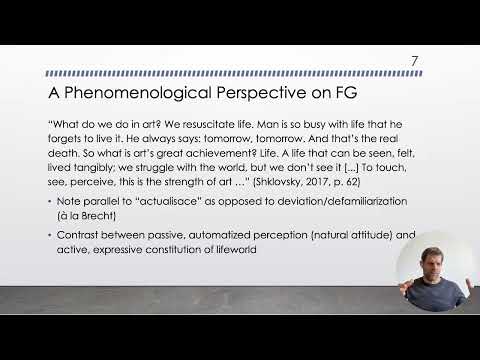 Speaker: Paul Sopcak @Paul
Speaker: Paul Sopcak @Paul
 Affiliation: MacEwan University, Alberta
Affiliation: MacEwan University, Alberta
Title: Foregrounding and Mündigkeit
Abstract: Foregrounding is a key term in the empirical study of literature, yet its conceptualization, measurement, and boundaries remain debated. In this symposium series, we present fresh approaches and perspectives from esteemed scholars and emerging researchers, sparking new discussions. The present symposium explores the concept of foregrounding and its broader implications. Together, we’ll examine its societal vitality through economics, unravel its intricate theoretical dimensions, and connect it to the profound educational ideal of Mündigkeit. These three presentations promise to challenge, inspire, and deepen our understanding of this multifaceted phenomenon.

 Long abstract
Long abstract
The concept of Mündigkeit is regularly presented as one of the main objectives of education in Germany. Sometimes misleadingly translated as “maturity”, its history dates back to Kant and more recently to Adorno. While “maturity” accurately translates the term as applied in legal contexts, it obscures the concept’s richness of meaning endowed by Kant and Adorno, such as the “capacity for independent thought, for reflexiveness, for fairness, for detachment and self-criticism and, as appropriate, for commitment and moral courage” (French & Thomas, 1997, p. 7). The moral and normative overtones to this educational goal are obvious, as are its dependence on forms of autonomy and freedom.
In the proposed paper, I first develop a bridge between Mündigkeit and Husserl’s (2001) understanding of “sense-giving thinking” (27) and “genuine thinking” (32), which he relates to understanding the “human being in the full and highest sense” (6) and of posing to “[one]self and to the world questions of ultimate knowledge and conscience” (6). Specifically, I describe how Husserl’s (2001) philosophical analysis of sense constitution presents the genesis of this kind of thinking as moving from passive syntheses to ones that are active and involve “egoic acts” and “awakenings.” I will then present historical and theoretical evidence to establish the phenomenological roots of the notion of foregrounding and argue that its originally proposed function was to elicit precisely the kind of thinking – through an aesthetic engagement with art –that has been related to Mündigkeit. I close by briefly situating this proposal in the present empirical and theoretical discourse on foregrounding (and education).
References
French, R. & Thomas, J. (1999). Maturity and Education, Citizenship and Enlightenment: An Introduction to Theodor Adorno and Hellmut Becker, ‘Education for Maturity and Responsibility’. History of the Human Sciences 12(3), 1-19.
Husserl, E. & Steinbock, A. J. (2001). Analyses Concerning Passive and Active Synthesis: Lectures on Transcendental Logic. Edmund Husserl Collected Works 9. Dordrecht: Kluwer academic publ.

